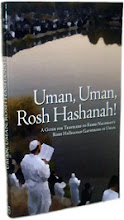From “The Breslov Pirkey Avot,”
Chapter 3, Mishnah 2
רַבִּי חֲנִינָא
סְגַן הַכֹּהֲנִים אוֹמֵר, הֱוֵי מִתְפַּלֵּל בִּשְׁלוֹמָהּ שֶׁל מַלְכוּת,
שֶׁאִלְמָלֵא מוֹרָאָהּ, אִישׁ אֶת רֵעֵהוּ חַיִּים בָּלָעוּ.
רַבִּי חֲנַנְיָא
בֶּן תְּרַדְיוֹן אוֹמֵר, שְׁנַיִם שֶׁיּוֹשְׁבִין וְאֵין בֵּינֵיהֶן דִּבְרֵי
תוֹרָה, הֲרֵי זֶה מוֹשַׁב לֵצִים, שֶׁנֶּאֱמַר (תהלים א'), וּבְמוֹשַׁב לֵצִים
לֹא יָשָׁב. אֲבָל שְׁנַיִם שֶׁיּוֹשְׁבִין וְיֵשׁ בֵּינֵיהֶם דִּבְרֵי תוֹרָה,
שְׁכִינָה שְׁרוּיָה בֵינֵיהֶם, שֶׁנֶּאֱמַר (מלאכי ג'), אָז נִדְבְּרוּ יִרְאֵי
יְיָ אִישׁ אֶל רֵעֵהוּ וַיַּקְשֵׁב יְיָ וַיִּשְׁמָע וַיִּכָּתֵב סֵפֶר זִכָּרוֹן
לְפָנָיו לְיִרְאֵי יְיָ וּלְחשְׁבֵי שְׁמוֹ.
אֵין לִי אֶלָּא
שְׁנָיִם. מִנַּיִן שֶׁאֲפִלּוּ אֶחָד שֶׁיּוֹשֵׁב וְעוֹסֵק בַּתּוֹרָה,
שֶׁהַקָּדוֹשׁ בָּרוּךְ הוּא קוֹבֵעַ לוֹ שָׂכָר, שֶׁנֶּאֱמַר (איכה ג'), יֵשֵׁב
בָּדָד וְיִדֹּם כִּי נָטַל עָלָיו:
Rabbi Chaninah, the Deputy High Priest, said,
“Pray for the welfare of the government, because if not for fear of the ruling
authorities, people would swallow each other alive.”
Rabbi Chananyah ben Tradyon said, “When two
sit together without sharing words of Torah, this is a seat of scoffers, as it
is written, ‘And in a seat of scoffers he did not sit’ (Psalms 1:1). But when
two sit together and speak words of Torah, the Divine Presence dwells in their
midst, as it is written, ‘Then those who feared God spoke with one another, and
God listened and heard, and a book of remembrance was written before Him for
those who revered God and meditated upon His name’ (Malachi 3:16).
“[From the above,] I may infer that this
applies to two [people]. How do we know that even if one person sits and
occupies himself with Torah, the Holy One, Blessed be He, sets aside a reward
for that one? Because it is written, ‘Let him sit alone and keep silent, for he is repaid for it’”
(Lamentations 3:28).
Digest of
Commentaries:
Pray for the
welfare of the government, including a non-Jewish government, for God has commanded, “And
seek the peace of the city where I have caused you to be carried away in
captivity, and pray to the Lord for it – because through its peace, you shall
have peace” (Jeremiah 29:7).
If not for
fear of the ruling authorities, people would swallow each other alive. This complements
the teaching of the Sages, “'And You made man as the fish of the sea' (Habakkuk
1:14) – why are men likened to fish? Just as the bigger fish swallow the
smaller ones, so it is among men. Those who are more powerful would destroy the
weaker if not for fear of the authorities” (Avodah Zarah 4a).
When two sit
together and speak words of Torah, the Divine Presence dwells in their midst, for through
their study of Torah they gain a glimpse of God’s glory (Meiri).
“Let him sit alone and keep silent, for he is
repaid for it.” God has set
aside a reward for him (Rashi). Alternately: The merit of anyone who
studies the Torah is so great that it is as if the Torah was given for his sake
alone (Rambam; Bartenura).
*
Pray for the welfare of the government
Reb Noson: Speech is intrinsically bound up with peace. Thus it is written,
“For the sake of my brothers and friends, I will now say, ‘Peace be with you’”
(Psalms 122:8).[i]
Therefore this teaching urges us to “pray for the welfare (literally,
'peace') of the government (literally, 'kingship').” In Kabbalistic
terms, this alludes to Malkhut (“Kingship”), the lowest of the Ten Sefirot,
which is associated with the mouth and the faculty of speech. When there is
peace, speech attains perfection (Likutey Halakhot, Reshit HaGez 1).
*
If not for fear of the ruling authorities
Rebbe Nachman: Being the lowest in the order of the Ten
Sefirot, Malkhut (“Kingship”) is the receptacle for the spiritual flow
from all the other sefirot. Therefore Malkhut on the side of holiness is
“the gatherer of all the tribal camps” (Numbers 10:25) – that is, the gatherer
of the spiritual lights of the nine sefirot above it.
It is written, “The end of the matter, when
all is considered, fear the Lord” (Ecclesiastes 12:13). This corresponds to
Malkhut, as our Sages state, “If not for fear of the ruling authorities.”
In other words, Malkhut is the receptacle for the spiritual lights of holiness
at “the end of the matter” and “the gatherer of all the tribal camps.”
The Ten Tribes of Israel correspond to the
Ten Sefirot. Malkhut corresponds to the Tribe of Dan, which is
“the gatherer [i.e., the last] of all the tribal camps.” This is also suggested
by the Talmudic axiom which uses a form of the word DaN: "DiNa
de-malkhuta DiNa" (“The law of the kingdom is the law”) (Gittin
10b). Thus fear and awe of God is the vessel that contains and encompasses all
other holy qualities.
But Malkhut of the Other Side (the realm of
the unholy) is a “gatherer” too — a gatherer of money (Likutey Moharan
I, 56:5).[ii]
*
Lasting Impression
The following tradition has been preserved by
the Breslover Chassidim:
Reb Zushe of Anipoli, a close disciple of the
Maggid of Mezeritch and a legendary early Chassidic master, once explained,
“How could two Jews possibly sit together without sharing words of Torah? We
are forced to conclude that the place in which they found themselves had
previously been ‘a seat of scoffers,’ and the negative spiritual
impression that remained is what caused these two unfortunates to speak empty
words” (Siach Sarfey Kodesh V, 494).

















